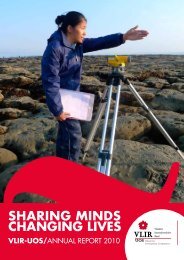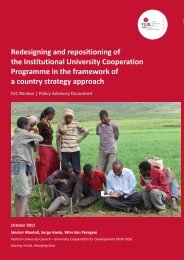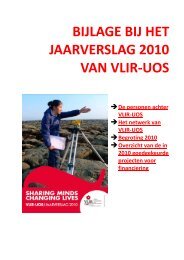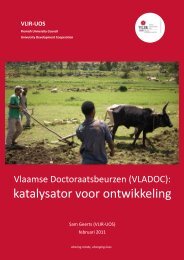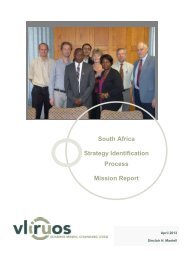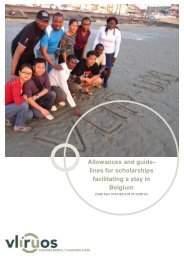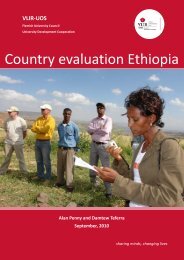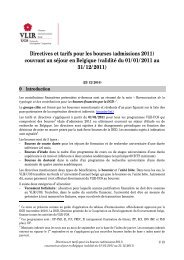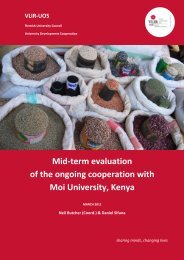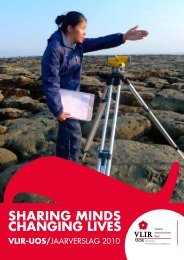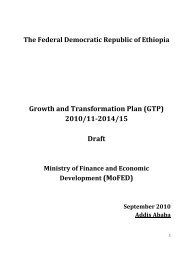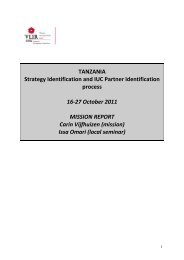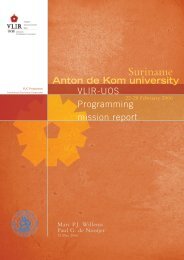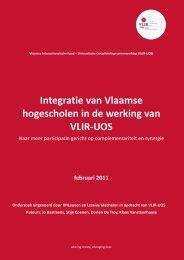Education Sector Development Program - VLIR-UOS
Education Sector Development Program - VLIR-UOS
Education Sector Development Program - VLIR-UOS
Create successful ePaper yourself
Turn your PDF publications into a flip-book with our unique Google optimized e-Paper software.
<strong>Education</strong> <strong>Sector</strong> <strong>Development</strong> <strong>Program</strong> IV<br />
levels (Diploma, BA, MA and PhD). In addition,<br />
sign language training is been given as a subject<br />
in BA level in one Higher <strong>Education</strong> Institution.<br />
Meanwhile, the educational management,<br />
organization, community participation and<br />
finance guidelines foresee that two teachers<br />
trained in SNE should be assigned in primary<br />
and first cycle secondary schools in order to<br />
facilitate the education of students with special<br />
educational needs. But this measure has not yet<br />
been implemented.<br />
Main challenges<br />
• There is still very limited access to<br />
formal education by children with<br />
special educational needs.<br />
• Limited awareness within the<br />
education sector and among<br />
teaching staff about SNE.<br />
• The cooperation between MoE,<br />
other ministries and different<br />
partners is not well developed.<br />
• The existing special classes are<br />
understaffed and have inadequate<br />
instructional materials.<br />
• There are still insufficient and<br />
inappropriate opportunities for<br />
teacher training.<br />
• An adequate support system for<br />
students with special educational<br />
needs is not yet in place (e.g.<br />
resource centres, adaptive<br />
technologies)<br />
2. Expected program outcomes<br />
❚<br />
❚<br />
❚<br />
Enrollment of children with special<br />
educational needs increased at all<br />
levels of education and due attention<br />
will be given to girls with special<br />
needs<br />
Number of trained teachers in SNE/<br />
inclusive education increased<br />
Capacity of schools in addressing the<br />
academic and social needs of children<br />
with special educational needs<br />
improved<br />
Key outcome targets<br />
Primary school enrolment of students with<br />
special educational needs will increase from<br />
47,461 in 2009/10 to 1,739,000 in 2014/15 2<br />
Secondary school enrolment of students with<br />
special educational needs will increase from<br />
3,910 in 2009/10 to 8,586 in 2014/15<br />
Higher education enrolment of students with<br />
special educational needs will increase from<br />
389 in 2009/10 to 946 in 2014/15<br />
All Teacher <strong>Education</strong> Institutes and Colleges<br />
of Teacher <strong>Education</strong> will be provided with an<br />
SNE/inclusive education training component by<br />
2014/15<br />
The proportion of teachers trained for teaching<br />
children with special educational needs will<br />
increase to 25% in 2014/15<br />
The percentage of schools with appropriate<br />
facilities for SNE/inclusive education will<br />
increase to 25% in 2014/15<br />
The nine resource centers will be increased to<br />
500 by 2014/15<br />
3. Policy and strategies<br />
The Ministry of <strong>Education</strong> has adopted a SNE/<br />
inclusive education strategy regarding the<br />
provision of the service within the existing<br />
structure and in the framework of inclusive<br />
education. The final goal of the strategy is<br />
to ensure access and quality education for<br />
marginalized children particularly for children<br />
with SNE such as the ones with disabilities. The<br />
General <strong>Education</strong> Quality Improvement <strong>Program</strong><br />
(GEQIP) has also given attention to these issues<br />
and incorporated it in its teacher development<br />
component. Thus a provision of teacher training<br />
has been singled out as “Training teachers in SNE<br />
screening”. <strong>Program</strong>s related to strengthening<br />
SNE Pre-Service and In-Service Teacher Training<br />
and provision of SNE <strong>Education</strong> Materials to<br />
TEIs and cluster resource centers are also being<br />
implemented.<br />
2 The intention, in order to achieve EFA in 2015, is to<br />
enroll all children with special educational needs in primary<br />
school. Their number in 2007 is estimated at 10% of the total<br />
estimated enrolment in that year.<br />
77



